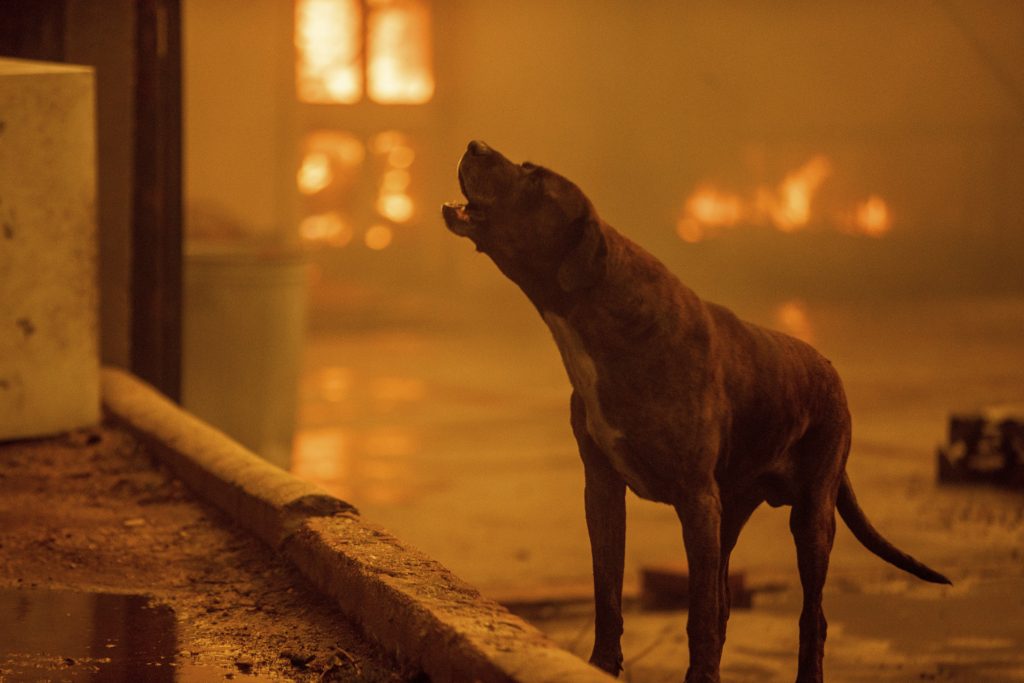Southern California is currently grappling with multiple devastating wildfires, forcing evacuations for over 100,000 residents and raising significant concerns about the safety and well-being of pets and animals. The widespread destruction, encompassing approximately 40,000 acres, has overwhelmed animal shelters and necessitated emergency preparedness measures for pet owners. Veterinary experts and organizations are offering crucial advice and resources to help navigate this challenging situation and ensure the safety of animals caught in the path of these fires.
One of the primary concerns for pets during wildfires is the hazardous impact of smoke and ash inhalation. Veterinarian Stevie Aitken emphasizes the importance of keeping pets indoors as much as possible to limit their exposure to these harmful elements. If outdoor trips are unavoidable, Aitken recommends using absorptive pads for dogs to encourage indoor bathroom breaks and meticulously wiping down paws with wet towels or baby wipes upon re-entry. This helps remove soot and prevents pets from ingesting it through licking. For further protection, specialized dog goggles (“doggles”) and canine masks are available to shield their eyes and respiratory systems from irritants and smoke.
Preparing a comprehensive emergency kit is crucial for pet owners in wildfire-prone areas. Aitken advises packing a bag containing at least a week’s supply of food, a water bowl, any necessary medications, a collar and leash with an updated name tag, and ideally, an AirTag or similar tracking device attached to the collar. A six-foot, fixed leash is recommended over retractable leashes to maintain better control and prevent pets from venturing into hazardous areas. Including recent medical records in the kit can also prove invaluable if the pet requires temporary shelter or veterinary care. Finally, carrying recent photographs of the pet can aid in identification and recovery efforts in case of separation.
Beyond individual preparedness, the veterinary community is actively responding to the crisis. Dr. Sandra Faeh, president of the American Veterinary Medical Association (AVMA), expressed solidarity with those affected by the fires and highlighted the organization’s commitment to providing support. The AVMA is offering a range of free resources designed to assist pet owners, livestock owners, and veterinary professionals in protecting animals and effectively responding to emergencies. These resources likely include guidance on evacuation procedures, animal first aid, and establishing emergency preparedness plans.
The ongoing wildfires, namely the Palisades, Eaton, and Hurst fires, continue to pose a threat, although containment efforts are progressing. The Palisades fire has reached 13 percent containment, the Eaton fire stands at 27 percent containment, and the Hurst fire is nearing full containment, according to the California Department of Forestry and Fire Protection (CAL FIRE). These containment figures represent a positive development, but the situation remains dynamic and requires continuous monitoring and effort.
The impact on animal shelters has been substantial, with many facilities facing capacity limitations due to the influx of displaced animals. This underscores the importance of individual preparedness and proactive measures by pet owners. By following the advice of veterinary experts and utilizing available resources, individuals can significantly enhance the safety and well-being of their pets during these challenging times. The collective efforts of pet owners, veterinary professionals, and emergency response teams are crucial in mitigating the impact of these wildfires on animal welfare. The situation continues to evolve, and staying informed about the latest developments and adhering to official guidance is paramount for the safety of both humans and animals.










